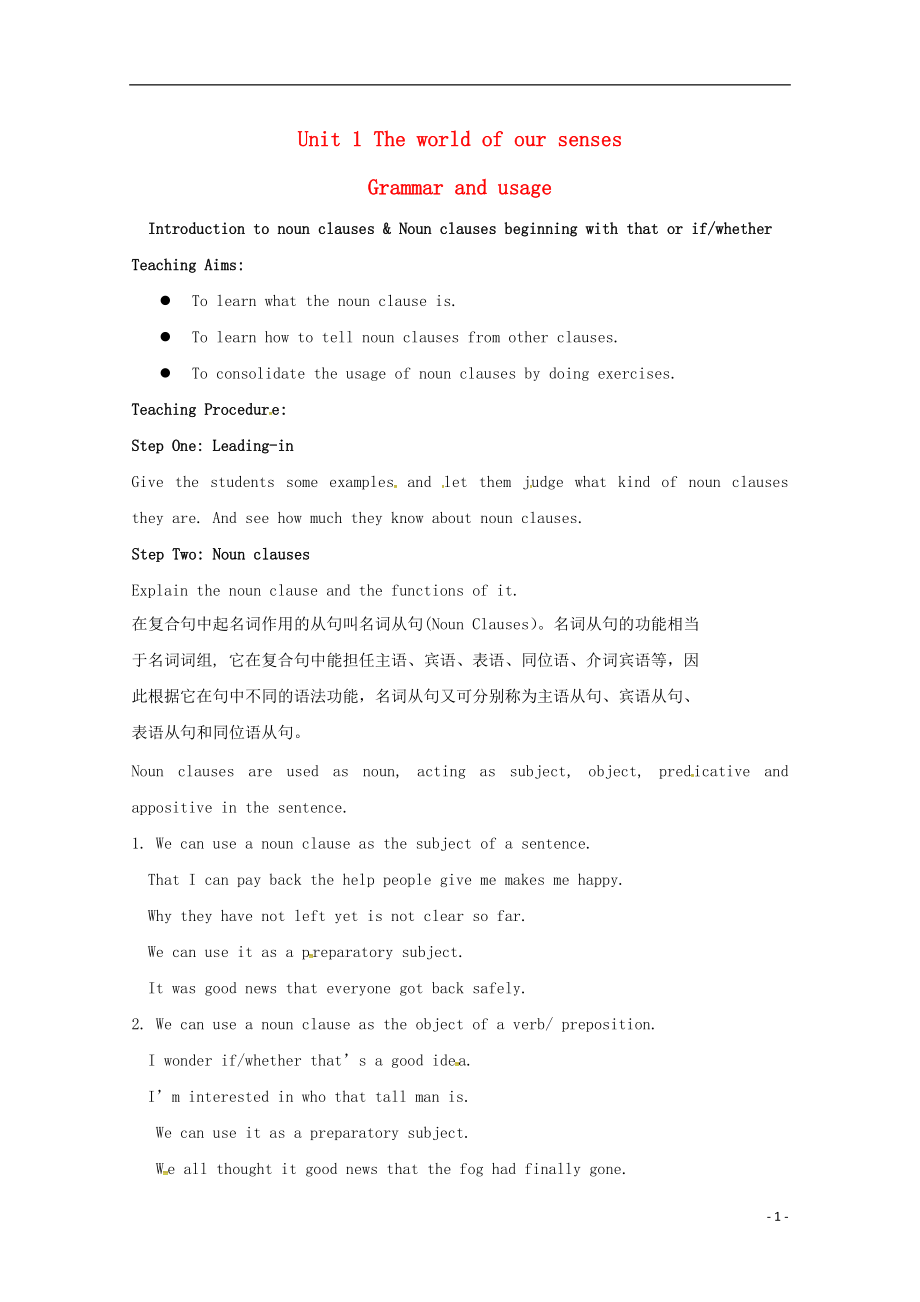《湖南省茶陵縣高中英語(yǔ) Unit 1 The world of our senses Grammar and usage教案 牛津譯林版必修3》由會(huì)員分享�����,可在線閱讀����,更多相關(guān)《湖南省茶陵縣高中英語(yǔ) Unit 1 The world of our senses Grammar and usage教案 牛津譯林版必修3(3頁(yè)珍藏版)》請(qǐng)?jiān)谘b配圖網(wǎng)上搜索。
1�、
Unit 1 The world of our senses
Grammar and usage
Introduction to noun clauses & Noun clauses beginning with that or if/whether
Teaching Aims:
l To learn what the noun clause is.
l To learn how to tell noun clauses from other clauses.
l To consolidate the usage of noun clauses by doing exerci
2、ses.
Teaching Procedure:
Step One: Leading-in
Give the students some examples and let them judge what kind of noun clauses they are. And see how much they know about noun clauses.
Step Two: Noun clauses
Explain the noun clause and the functions of it.
在復(fù)合句中起名詞作用的從句叫名詞從句(Noun Clauses)����。名詞從句的功
3����、能相當(dāng)
于名詞詞組, 它在復(fù)合句中能擔(dān)任主語(yǔ)�、賓語(yǔ)、表語(yǔ)�、同位語(yǔ)、介詞賓語(yǔ)等�,因
此根據(jù)它在句中不同的語(yǔ)法功能����,名詞從句又可分別稱為主語(yǔ)從句、賓語(yǔ)從句�����、
表語(yǔ)從句和同位語(yǔ)從句����。
Noun clauses are used as noun, acting as subject, object, predicative and appositive in the sentence.
1. We can use a noun clause as the subject of a sentence.
That I can pay back the help people give me
4、 makes me happy.
Why they have not left yet is not clear so far.
We can use it as a preparatory subject.
It was good news that everyone got back safely.
2. We can use a noun clause as the object of a verb/ preposition.
I wonder if/whether that’s a good idea.
I’m interested in who th
5�、at tall man is.
We can use it as a preparatory subject.
We all thought it good news that the fog had finally gone.
The conductor has made it clear that no buses will be running.
3. We can use a noun clause as the predicative of be.
The truth is that it’s too foggy for the bus to run
6、that far.
My question is whether Polly can find her way home.
4. We can use a noun clause in apposition to a noun.
She had a feeling that she was being watched.
The news that he couldn’t come made us upset.
5. We use that, if/whether or a question word to begin a noun clause.
No one kn
7�、ew if/whether he lost his sight because of an accident.
She couldn’t imagine how the blind man had found her.
Do an exercise to see if the students understand.
Step Three: More about usage of noun clauses
1. the order of noun clause
一、名詞性從句的語(yǔ)序
(1)名詞性從句構(gòu)成有兩種
a. That + 陳述句
e.g. That he is
8����、still alive is a wonder.
他還活著�,真是奇跡�。
b. 疑問(wèn)詞+句子的剩余成分
e.g. This is what we are looking for.
這就是我們所尋找的。
(2) 疑問(wèn)詞引導(dǎo)的名詞性從句要求使用陳述句語(yǔ)序�����,不能用一般疑問(wèn)句語(yǔ)序�����。
2. the conjunction
(1) that 和what 的選用
that 和 what 都可引導(dǎo)所有的名詞從句�。但是,what除起連接作用外�,還在名詞性從句中充當(dāng)成分,可做從句的主語(yǔ)����、賓語(yǔ)、或表語(yǔ)����。而that在名詞性從句中不充當(dāng)任何成分,只起連接作用�。
3. th
9�、e noun clauses beginning with that or if/whether
1) 引導(dǎo)動(dòng)詞的賓語(yǔ)從句時(shí)�����;
2) 在be + adj.之后時(shí)�;
3) 在主語(yǔ)從句中,it 用作形式主語(yǔ)時(shí)����。
? 只能用whether的情況:
1) 在非正式文體中,if ... or not 也是正確的����。但與or not直接連用時(shí)�����,只能用whether(即whether or not)�,而不能用if (即if or not);
2) 引導(dǎo)表語(yǔ)從句和同位語(yǔ)從句時(shí)�����;
3) 引導(dǎo)主語(yǔ)從句����,且位于句首時(shí)�����;
4) 引導(dǎo)介詞后的賓語(yǔ)從句時(shí)�����;
5) 后面直接跟動(dòng)詞不定式時(shí)�;
6) if引起歧義時(shí)�����。
Step Four: Practice
Ask students to do some exercises to consolidate what they have learnt.
Step Five: Homework
Do Parts C1and C2 on Page 92 in Workbook.
Preview the next Part.
- 3 -
 湖南省茶陵縣高中英語(yǔ) Unit 1 The world of our senses Grammar and usage教案 牛津譯林版必修3
湖南省茶陵縣高中英語(yǔ) Unit 1 The world of our senses Grammar and usage教案 牛津譯林版必修3

